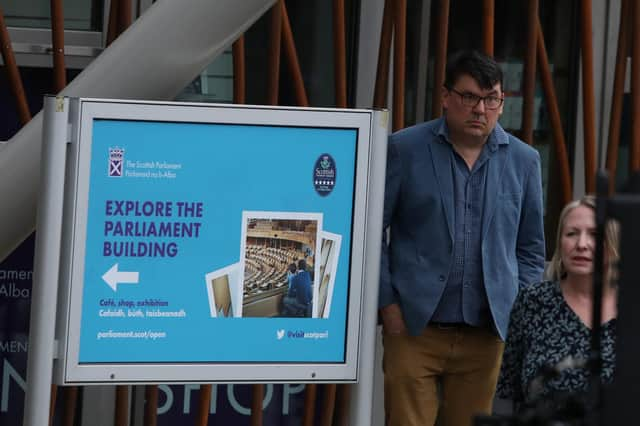Like it or not, Graham Linehan has every right to speak freely - Euan McColm


Should I choose to time things so that it closes directly on your schnozz as you arrive at the threshold, then that is my right.
Or lives are full of moments when doing the right thing is optional. The law can’t force us not to be dickheads. Many of us may thank that loophole for our liberty.
Advertisement
Hide AdAdvertisement
Hide AdOf course, we don’t – or shouldn’t – require legislation to instruct every aspect of our behaviour because we know better. We know that the choices we make dictate the sort of world we live in. We know that respect for others – and a healthy amount of “live and let live” attitude – makes society work. It is in all of our interests for this to be so.
One matter of shared interest where we could be doing better currently is that of freedom of expression.
Yes, the law provides us with the right to speak freely but it is not enough for us to depend on legislators to ensure that right endures. Freedom of expression is s fragile and precious thing to be protected by all of us.
Right now, it feels like this is a right under constant attack.
The current vogue, when it comes to those with whose views some fiercely disagree, is to attempt to shut them up.
Last week, management at the Leith Arches announced the cancellation of a comedy show at which the Father Ted co-writer Graham Linehan was to appear. Management said they’d acted in response to “outraged members of our community”.
Linehan – whose credits also include The IT Crowd and Black Books – hais become a hugely controversial figure in the current debate over whether trans rights and women’s rights are compatible.
Linehan holds gender critical views and has expressed strong concerns about the implications for single-sex space of allowing individuals to self-ID.
Advertisement
Hide AdAdvertisement
Hide AdThere’s no question that Linehan can be undiplomatic in his approach to this subject. Indeed, some of those who agree with him have been critical of his tone.
However, his position is a widely held one. Recent polling shows, for example, that two thirds of Scots disagree with plans by the Scottish Government to introduce gender self-ID. Many wonder how, If any man may simply declare himself a woman, single-sex spaces can be maintained.
The reaction from the liberal left to the cancellation of Linehan’s show was troubling. From most comedians, there was silence. Some even applauded the venue’s decision.
A common refrain across social media was that Linehan was not being cancelled and that it was up to the venue which events it hosted.
Well, up to a point, Lord Copper.
In fact, any business which withholds a service on the basis of an individual’s legally protected beliefs opens itself up to legal action.
It is not correct to say venues have carte blanche to cancel performances by acts of which they disapprove. Having taken. booking, the law expects them to honour it.
But let’s say it was true that businesses could shut down performers with impunity. Would that really be good enough? Would we really want to live in a society where any and all platforms could be withdrawn on the whim of a middle manager fearful of a social media storm?
An attempt by The Stand comedy club to cancel a separate fringe event featuring the gender critical SNP MP Joanna Cherry backfired after she threatened legal action. Managers swiftly backed down, apologising to Cherry, and the show went on.
Advertisement
Hide AdAdvertisement
Hide AdLast year, the comedian Jerry Sadowitz was booked to appear across two nights during the Fringe at The Pleasance. His second performance was cancelled after the first show attracted complaints from staff, seemingly distressed that they’d had to witness Sadowitz in all his furious, misanthropic glory.
From those whose defence of our shared right to express ourselves freely is more theoretical than practica, came the explanation that freedom of speech doesn’t mean freedom from consequences.
Enough of this nonsense. Enough!
Freedom of speech must mean freedom from consequences, or it isn’t freedom of speech.
Filled with moral fervour, those whose encourage or support the cancellation of events involving those with whom they disagree may have convinced themselves they are on, as the currently popular saying goes, “the right side of history” but they are gravely mistaken.
Instead, they weaken the line of defence against authoritarian politicians who would gladly restrict our freedoms if it suited them to do so.
There is a fine line to walk through this. Our freedom of expression includes the freedom to protest the views of others. People must have the right to gather in opposition to a particular message or creed.
But there is a difference between protesting outside a comedy show and having it cancelled.
Those who would erode the rights of others to speak don’t merely risk turning their targets into martyrs, they undermine their own freedom. If we think it fair to silence someone because we find their opinions upsetting, we give up the right to expect any defence when the mob comes for us.
Advertisement
Hide AdAdvertisement
Hide AdThe law does not compel us to defend anyone’s freedom of speech, but we should do so, instinctively.
It is in all of our interests for us to make an effort in this area. Rather than encouraging the cancellation of those with whom we disagree, we must stand in their support.
For – regardless of differences of opinion – their right to speak freely is our right, too.
Comments
Want to join the conversation? Please or to comment on this article.